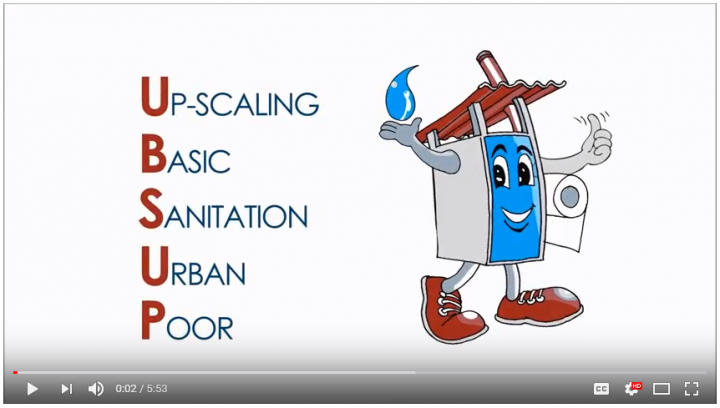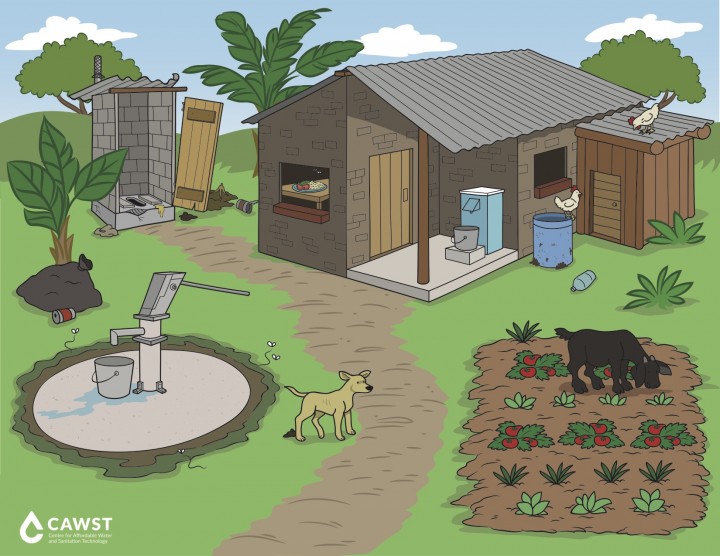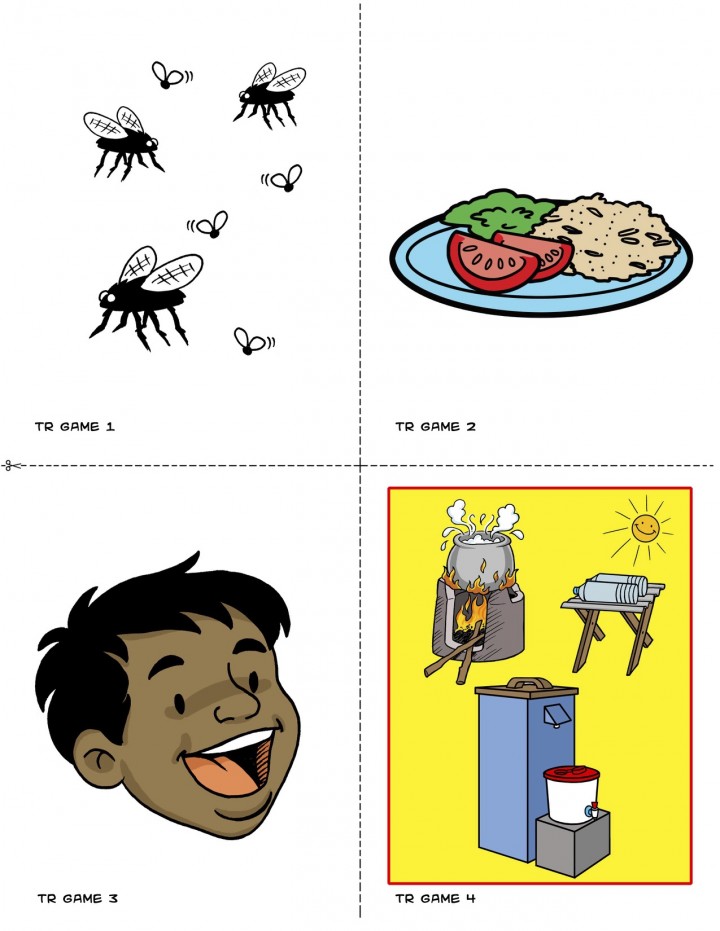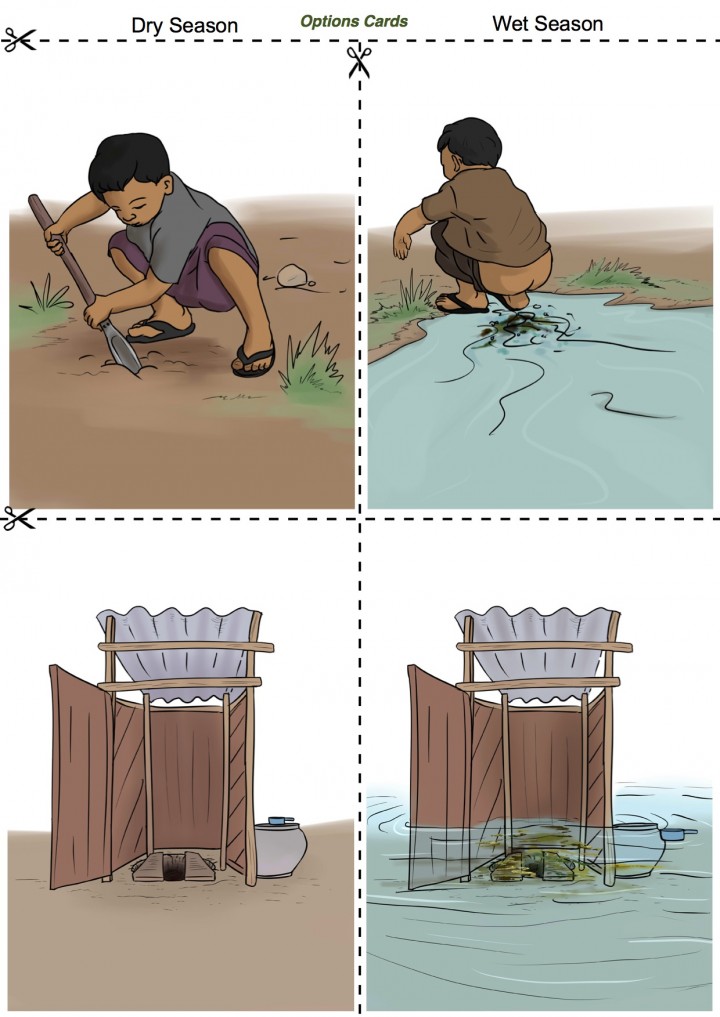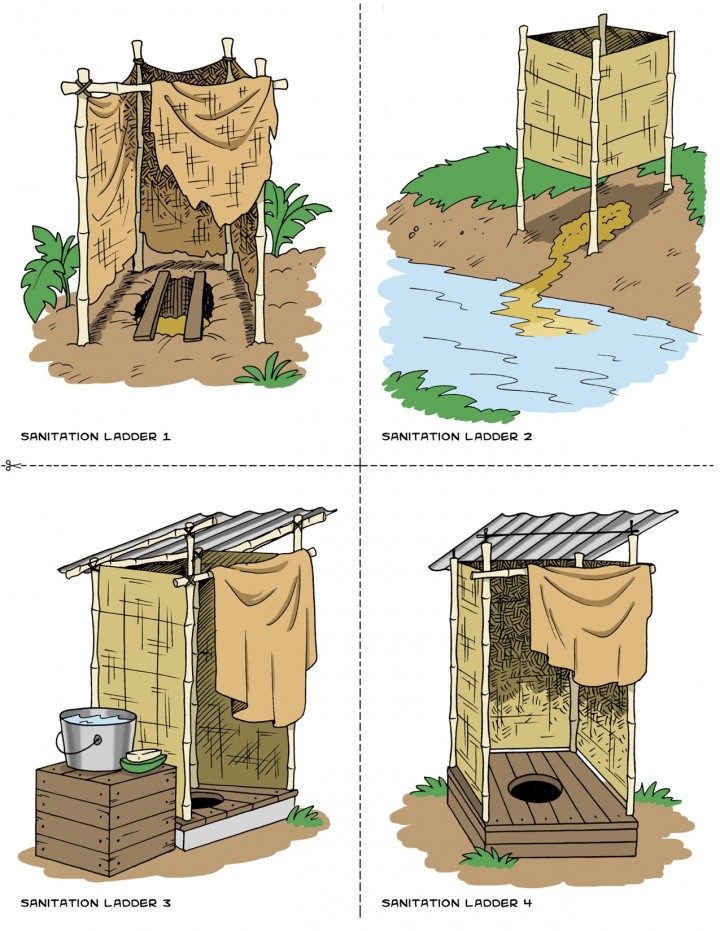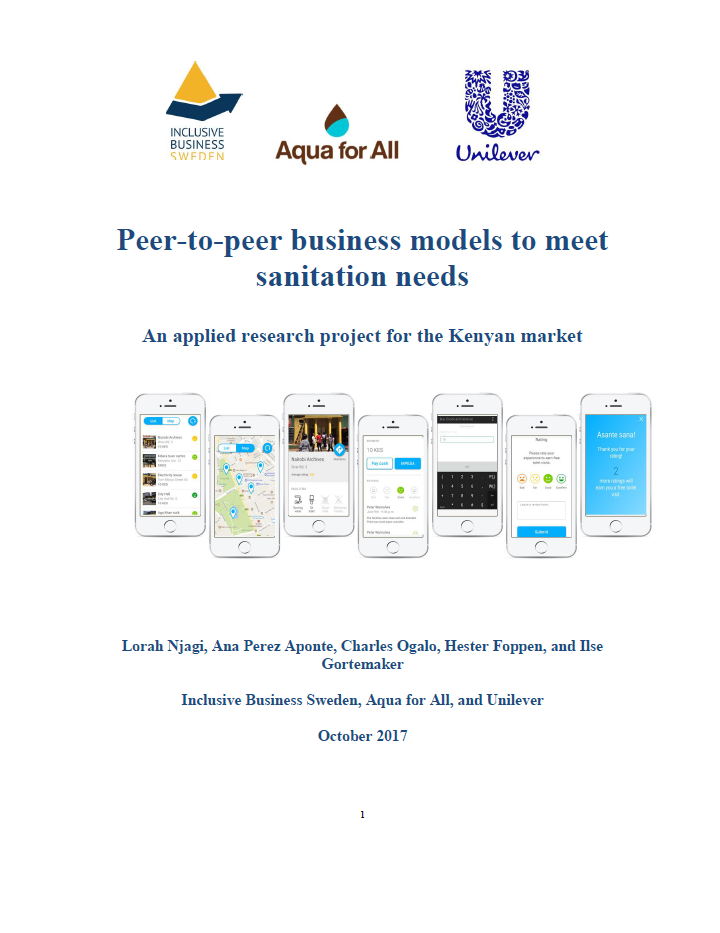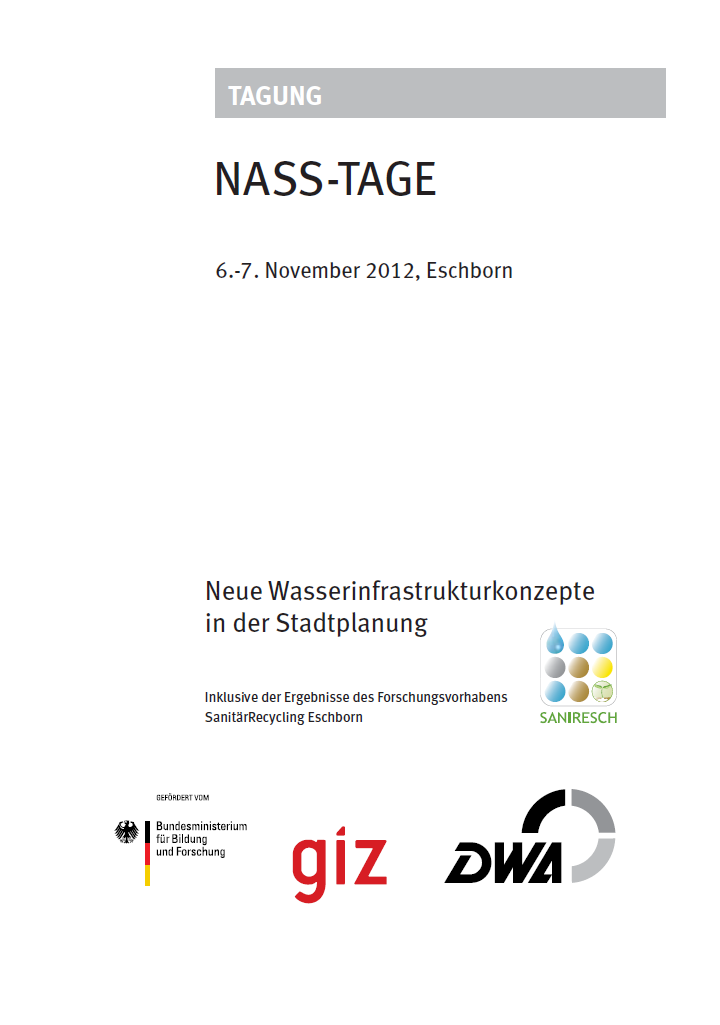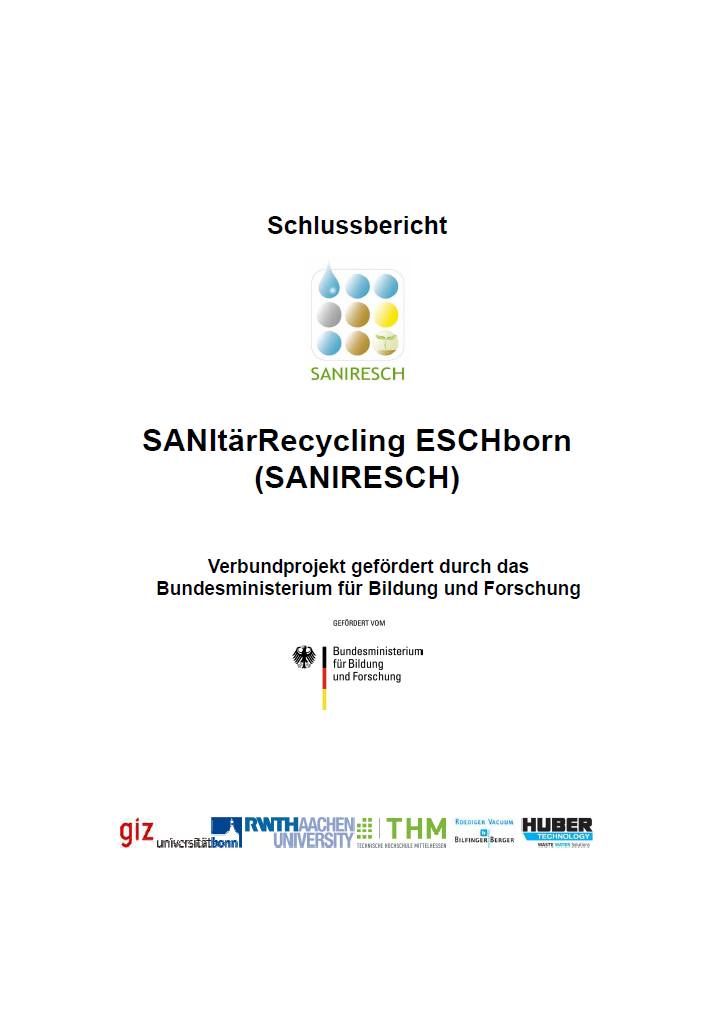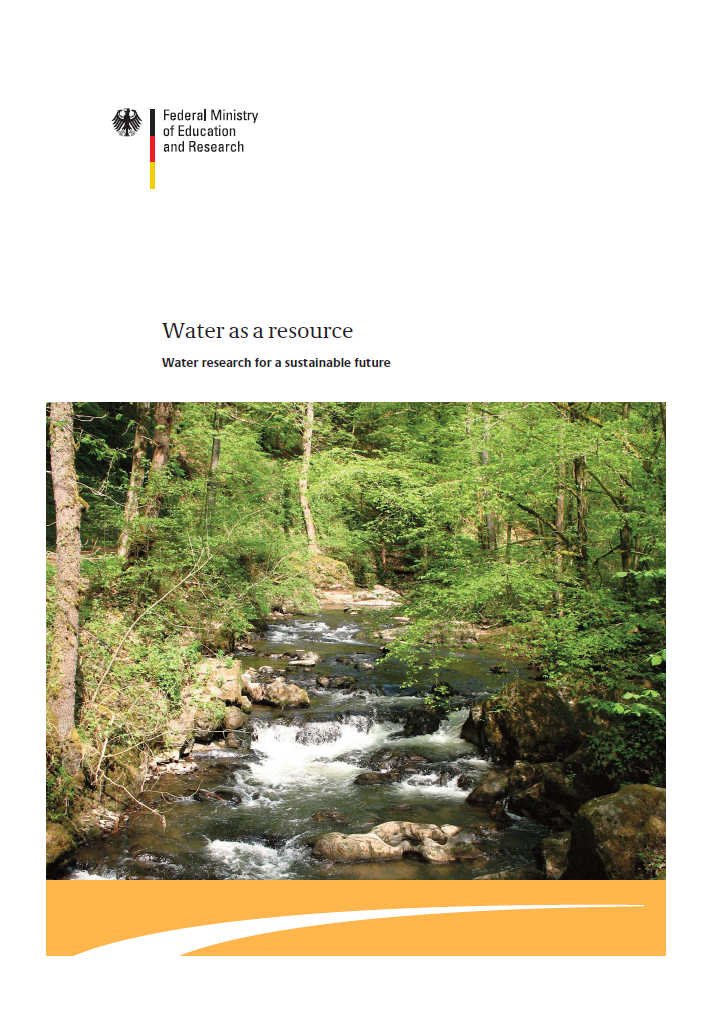WSTF (2018) UBSUP: Scaling up of basic sanitation for poor urban areas in Kenya (UBSUP: mise à l’échelle de l’assainissement de base pour les zones urbaines pauvres au Kenya) (in French and English)
Le programme de mise à l’échelle de l’assainissement de base pour les zones urbaines pauvres (UBSUP) est une solution éprouvée pour améliorer l’accès des ménages à l’assainissement dans les zones urbaines à faible revenu au Kenya, couvrant la chaine d’assainissement dans son intégralité : des toilettes jusqu’au traitement. UBSUP est géré par le Water Sector Trust Fund (Fond d’Affectation du Secteur de l’Eau) et mise […]
CAWST (2017) The WASH Detective Activity
This tool helps people practice identifying WASH issues in a household. It also helps people learn how to find out more information on why the WASH issues exist in a household. It is designed for the Community WASH Promotion workshop; however, it can be used for any audience.
CAWST (2014) Transmission Routes Activity (in English, French and Spanish)
This document includes the transmission routes activity and instructions for facilitating the activity. The transmission routes activity is a participatory tool to educate people about how feces can make us sick. The tool also helps a group of people to identify how to stop the transmission of water-related diseases.
CAWST, EWB (2017) Sanitation Steps for Flood-Prone Areas (in English, French and Spanish)
The Sanitation Steps for Flood-Prone Areas is a fun and interactive game that helps people living in flood-prone areas identify appropriate options to improve sanitation in their community. This activity was developed by Engineers Without Borders Australia (EWB) and CAWST. The document includes activity cards and facilitator instructions.
CAWST (2017) Sanitation Ladder (in English, French and Spanish)
This document includes the sanitation ladder activity and instructions for facilitating the activity. The sanitation ladder activity is a participatory tool to help people to identify options for improving sanitation in their community and realize that this can be a gradual process.
Various Authors (2015) Bonn WASH Nutrition Forum Bonn, Germany
High-level experts from the sanitation and nutrition sector gathered together in the headquarter of Germany’s international broadcaster Deutsche Welle, Bonn for the WASH and Nutrition Forum on November 11th and 12th to discuss strategies for integrating WASH and nutrition programming in development and humanitarian contexts.
Various Authors (2015) City Partnership Meeting & FSM Toolbox Planning Workshop Hanoi, Vietnam
The Bill & Melinda Gates Foundation (BMGF) and the United Kingdom Department for international Development (DfiD) are collaborating to demonstrate how cities can use binding service level agreements and performance-based contracts with private sector partners as a way to ensure the city-wide delivery of sustainable sanitation services that are equitable and provide both private and public benefits. Under this joint initiative, eleven teams from South Asia […]
Njagi, L., Aponte, A.P., Ogalo, C., Foppen, H., and Gortemaker, I. (2017) Peer-to-peer business models to meet sanitation needs An applied research project for the Kenyan market
Uber, the world’s largest taxi company, owns no vehicles. Airbnb, the world’s largest accommodation provider, owns no real estate. Peer-to-peer (P2P) business models such as these have achieved scale globally, and relatively quickly. These P2P business models provide an organised way for us to collectively share certain resources. Could similar solutions reduce the barriers to sharing of the limited existing sanitation facilities in low income […]
Various Authors (2012) NASS-Tage within SANIRESCH Project
A conference in cooperation between DWA and BMBF with the title "New water infrastructure concepts for urban planning" took place at the headquarters of the GIZ in Eschborn from 6 to 7 November, 2012. The conference language was German. The first day of the conference the results of the SANIRESCH project were presented. The second day was devoted to sessions regarding "Integration of alternative sustainable sanitation […]
Various Authors (2013) List of SANIRESCH Publications
This library entry consists of articles, papers and presentations of SANIRESCH project. The factsheets are available in each library entry of project components.
Winker, M. & Rieck, C. (2013) SANIRESCH Project Results
SANIRESCH was running from July 2009 till Decemeber 2012. The results of the project were presented in periodical project meetings. There is also an English summary available in which the most important slides of the different presentations are translated into English. The factsheets for each project components can be download under each project component library entries.
Various Authors (2012) General project information within SANIRESCH Project
Knowledge of new sanitary systems is growing in Germany. However, further research and development is required for all system components before production can begin. The “Sanitary recycling Eschborn” was helping to achieve this: the focus of its work is on how to implement the alternative solution approach and use wastewater in an environmentally compatible manner. A federally owned company was being used for the demonstration, […]
Various Authors (2016) Habitat III Conference - The New Urban Agenda, Quito, Ecuador Conference materials
Habitat is a United Nations Conference on Housing and Sustainable Urban Development held every 20 years. The 3rd conference took place in Quito, Ecuador on 17th to 20th October. Facing the fact that this century will see a substantial majority of the world’s population living in urban centers, the focus of Habitat III Conference was the adoption of a New Urban Agenda — an action-oriented […]
Various Authors (2016) International Learning Exchange (ILE) - Jakarta, Indonesia Conference materials
On 14 - 18 November 2016, 160 Experts from 16 Asian countries came together in Jakarta to exchange their experience regarding innovative WASH in Schools (WinS) approaches. The 5th WASH in Schools International Learning Exchange (ILE), was hosted by the Ministry of Education and Culture of Indonesia – with support from UNICEF and GIZ. The conference concluded with a general agreement among the participants that WinS […]
Various authors (2017) FSM4 Conference - The Key Role of FSM in Modern Urban Sanitation Systems Chennai, India
The fourth conference on developments in Faecal Sludge Management (FSM) took place in Chennai, India where the State Government recently initiated measures to address FSM with regard to policy, regulatory changes, innovative solutions, and pilots. The conference aimed at bringing together professionals working in the sector, including utilities, service providers, cities, governments, academics, scientists, consultants, donors and industries, to support the global initiative of disseminating sustainable […]
Various Authors (2017) SuSanA's 10th Anniversary Celebration Conference materials
On Tuesday the 17th of January 2017, the Sustainable Sanitation Alliance (SuSanA) celebrated its 10th anniversary in Eschborn, Germany where SuSanA was founded in 2007 by a range of actors who were actively involved in the sanitation sector. This year’s anniversary celebration took place under the theme "10 years SuSanA: How the changed sanitation paradigm contributes to the Sustainable Development Goals". During the celebration, SuSanA’s […]
Various Authors (2012) International adaptability within SANIRESCH Project
The analysis of the international adaptability of the three treatment systems a Magnesium-Ammonium-Phosphate (MAP) precipitation reactor and two membrane bioreactors (MBRs) treating the grey- and brownwater, designed for and used within the SANIRESCH project specifically focused on developing countries. The aim was to identify regions and typical situations that are suitable for the implementation of such systems. Additionally, adaptations required for running the treatment plants successfully […]
Various Authors (2012) Economic feasibility within SANIRESCH Project
Comparing the costs for SANIRESCH with today´s costs for conventional wastewater treatment and standard commercial fertiliser, the alternative system is more expensive for both “Office building” and “Agricultural application”. However, the sensitivity analyses show that a certain potential exists. The differences come especially through the higher running costs, which influence is bigger than the higher investment costs. However, the sensitivity analyses show that a certain […]
Various Authors (2012) Acceptance of the innovative sanitation system and the utilisation of human urine within SANIRESCH Project
The acceptance of the innovative sanitation system and the utilisation of human urine was investigated within the SANIRSCH-project. In conjunction with the agricultural production / legal situation component farmers were asked if they would be willing to fertilise their agricultural crops with human urine. In a second study consumers were asked if they would find products fertilised with urine acceptable. Final results were expected in […]
Various Authors (2012) Agricultural production / Legal situation within SANIRESCH Project
This component dealt with the agricultural use of urine and MAP (struvite) as fertiliser as well as the related legal aspects. The component was led by the University of Bonn. Here you can find the results of the project component "Agricultural production / Legal situation" that has been presented at the DWA conference "NASS-Tage" and the factsheet gives you a short overview about the main informations […]
